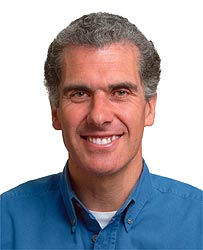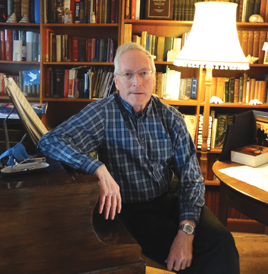 I never quite managed to witness a miracle at Holy Trinity Brompton ('HTB'), the large Anglican church in Knightsbridge where I attended the evangelical Christian induction course that goes by the name of Alpha, but I did see some very impressive sights. Like, for example, the penultimate session, when novices like myself were joined by a contingent of HTB regulars already well versed in the ways of the Holy Spirit. Nicky Gumbel (right), the vicar of HTB and the leading guru of Alpha, was directing proceedings from a raised stage in front of the altar. He started by requesting a couple of minutes of silent prayer, then asked if anyone had sensed while they were praying that others in the building were "suffering" in some way. About a dozen of the regulars raised their hands. Gumbel invited them to join him on the stage, where they proceeded to describe the ailments they had detected – "a man with a problem with his eye", "a woman who is sad because of a problem with her sister", and other similarly precise divinations. Gumbel then asked if anyone in the 300-plus congregation had been able to identify the afflictions as their own – and would you believe it, some could. As Gumbel helped us see, there was only one possible explanation: multiple-case extra-sensory perception, precipitated by the power of prayer.
I never quite managed to witness a miracle at Holy Trinity Brompton ('HTB'), the large Anglican church in Knightsbridge where I attended the evangelical Christian induction course that goes by the name of Alpha, but I did see some very impressive sights. Like, for example, the penultimate session, when novices like myself were joined by a contingent of HTB regulars already well versed in the ways of the Holy Spirit. Nicky Gumbel (right), the vicar of HTB and the leading guru of Alpha, was directing proceedings from a raised stage in front of the altar. He started by requesting a couple of minutes of silent prayer, then asked if anyone had sensed while they were praying that others in the building were "suffering" in some way. About a dozen of the regulars raised their hands. Gumbel invited them to join him on the stage, where they proceeded to describe the ailments they had detected – "a man with a problem with his eye", "a woman who is sad because of a problem with her sister", and other similarly precise divinations. Gumbel then asked if anyone in the 300-plus congregation had been able to identify the afflictions as their own – and would you believe it, some could. As Gumbel helped us see, there was only one possible explanation: multiple-case extra-sensory perception, precipitated by the power of prayer.
To be fair, this surreal stunt was not typical of the Alpha evenings I attended, but it nonetheless reveals something about the participants: it would not have been staged had most of them not been – how shall I say this? – receptive towards that kind of thing.
So why had I – an atheist – taken the decision to join them? The story begins 18 months previously when I arrived in London after a long period working abroad. One of the few people I knew in the city was a friend from university who had since become an evangelical Christian, and we ended up having some cordial but intense conversations about our respective beliefs. He also introduced me to a few people from his evangelical social circle – all intelligent, educated people in their 20s and 30s who nevertheless spoke of their "relationship with Jesus" with a disconcertingly straight face, and praised the influence of the Holy Spirit without it being a euphemism for an illegal stimulant.
This constituted my closest ever encounter with full-on religious faith, and I found it provoked in me an intense mixture of antipathy and fascination. From the veracity of the Resurrection to the existence of a troubleshooting personal deity, the evangelicals' truth-claims struck me as an enthralling psychological phenomenon. How had they immured these certainties from the mental faculties they presumably employed elsewhere in their day-to-day lives? With what anaesthetic did they numb any sense of intellectual dishonesty? How did they let themselves get away with it?
I found myself incorporating such questions into occasional anti-religion diatribes, one of which erupted in the otherwise relaxed surroundings of a ski chalet in the French Alps. I had got onto the subject of religion with two friends – one an agnostic, the other a very liberal Catholic – who remarked that my condemnations seemed a little overconfident for someone who had never actually seen the evangelicals' world "from the inside", and half-jokingly suggested that if I fancied myself as an open-minded freethinker I should drop in on an Alpha course and see how it affected my level of vitriol. Could I be absolutely sure I was right without seeing for myself?
I had to admit that I couldn't, and therefore I wasn't quite able to laugh off the challenge. Three months later I signed up for an Alpha course.
Alpha has its roots in the evangelical wing of the Anglican church, and tends to promulgate a charismatic brand of Christianity that puts an onus on the transforming powers of the Holy Spirit, but it also aims to be ecumenical and has been adopted by other denominations.
Courses consist of 10 weekly meetings, each including a meal, a talk by a Christian speaker (perhaps 'Christianity: Boring, Untrue and Irrelevant?' or 'Does God heal today?'), and group discussions. It has proved to be a spectacularly successful formula.
The overall decline in church attendance in the UK masks the fact that year by year a growing number of British people have embraced the Alpha experience. Since the early 1990s, when the course was created in its present format, an astonishing two million people in the UK have participated, and it is now run by more than 7,000 churches and other Christian organisations nationwide. It has also become a truly global operation, existing in more than 150 countries.
They even have celebrity endorsements, as its alumni include Sam Fox (former Page-3 girl), Geri Halliwell (former Spice Girl) and Jonathan Aitken (perjurer and former lost sheep; now a fervent Christian).
Courses are free, yet Alpha appears to have a lot of money to plough into promotional materials, and runs an advertising campaign featuring banners outside churches, advertisements on billboards, buses and taxis, and even a slick cinema ad, all featuring attractive young people and offering – with perhaps just a hint of presumptuousness – the opportunity to 'Explore the Meaning of Life'.
I consciously choose to do the course at Holy Trinity Brompton in Knightsbridge because in doing so I was going to the belly of the beast. Not only was HTB the place where the course was first developed, and which now houses the staff who run Alpha's international operation, but donations from its well-heeled congregations provide a significant portion of Alpha's income.
As it transpired, I rather surprised myself by going to a total of eight Alpha evenings at HTB – arguably an over-zealous response to the challenge issued in the ski chalet. On each occasion there were at least 250 people present, and the overwhelming majority were white, middle-class professionals aged between 20 and 35. At the very start we were divided into small groups of 10 or 12: each week we would eat together, listen to the talk, then reconvene to discuss what we had heard.
The evenings also included about 10 minutes of soft-rock hymns led by the in-house band: suffice to say my nightmares still echo with the elongated first syllable of 'Jeee-sus', held lingeringly for maximum emotive effect.
Four of the eight talks I attended were given by Nicky Gumbel himself. The former barrister is the main figure behind the reformatting and expansion of Alpha, and a prodigious author of evangelical books. He has an informal manner and a limitless supply of amusingly self-deprecating anecdotes, many of which bear similarities to biblical events. One evening, for example, he confided that a few years previously he had failed to realise that his squash partner was a famous England rugby international, and drew a parallel with the way Jesus' disciples did not always recognise that their leader was the Son of God.
But one thing Gumbel did not incorporate into his talks was an attempt to defend his faith on intellectual grounds. I suppose I was anticipating hearing something that might pass for an argument, but I soon gathered that this would not be forthcoming. I later inferred from Gumbel's writings that my misplaced expectations had derived from excessive adherence to the Enlightenment project, in which, fatally, as Gumbel puts it, "revelation was made subject to reason". Alpha was not to repeat the error.
Indeed, although Alpha does not always pursue a literalist interpretation of the Bible, the level of discursive sophistication was set early on when Gumbel breezily established Jesus' divine parentage on the basis of a few favourite passages from the New Testament.
Once the truth of a biblical proposition was established – by reference to the Bible – it was thereafter assumed to be fact, and would pop up in later sessions as evidence that other propositions were true.
And in any case, most of the talks had little time for historical or metaphysical foundations: instead they concentrated on conveying subjective experiences of faith, focusing particularly on vivid descriptions of fruitful personal encounters with the Holy Spirit. The emotional intensity of these experiences was deemed to demonstrate the truth of the belief system.
Clearly, therefore, despite the marketing, Alpha is less appropriate for people who want to 'explore' than for those with a prior inclination towards belief who are seeking to erect bulwarks against doubt. Arguably I could have picked up clues to this in the titles of some of the talks, such as 'How can I be sure of my faith?', 'How can I resist evil?', and 'How can I be filled with the Holy Spirit?'.
So why did I hang on for a full eight sessions? My aforementioned fascination played a part, but it had more to do with the lively debates on offer in my discussion group, which was atypical in including two agnostics and, if you can imagine this, a very combative Buddhist.
There was no great pressure to toe the line during the discussions, no implicit threat of ostracism to anyone who dissented, but then again there didn't need to be: the majority seemed to have been teetering on the edge of belief at the very start, and needed only the gentlest of nudges in order to travel in the expected direction.
With one of them I had a memorable conversation that struck me as offering an insight into the psychology of religious conversion: he told me he had studied philosophy at university and had been frustrated by the lack of 'answers' it provided, but then found Christianity
offered what he described as a 'short-cut'. He is now training to be an Anglican vicar.
On more than one occasion I asked my companions why they believed they were being given privileged access to what Gumbel describes as the "transcendent personal creator of the whole universe". What was it about Knightsbridge that allowed access to absolute truths whereas, say, Muslims in Whitechapel were picking up the wrong signals? Did God only broadcast to certain areas, a bit like Channel Five?
As the weeks passed, I gathered that my best chance of actually witnessing the Holy Spirit in action – or indeed experiencing it for myself – would come not at HTB but on
one of the climactic "Alpha weekends" in the somewhat unlikely surroundings of a Pontins holiday camp on the Sussex coast. It sounded unmissable.
When we arrived at Pontins, it transpired that the Holy Spirit had been booked for the Saturday early-evening slot in a large, dimly-lit hall adjoining the dining room. The soft-rock band initiated proceedings with some numinous instrumental numbers, then Gumbel, standing at the front of the hall, embarked on a softly-spoken monologue: he encouraged everyone to pray for the Holy Spirit's arrival, and hinted that those going through difficult periods in their lives were especially likely to receive a visit.
Minutes passed, arms were held aloft, and a few people began to cry – which Gumbel immediately identified as proof of connection with the Spirit. There was no shouting or falling over, but one or two individuals at the front did begin a low, rapid mumbling, vaguely reminiscent of a horse-racing commentary: such was my slightly anticlimactic introduction to the charismatic gift of speaking in tongues.
An obvious question arises: who is susceptible to this kind of thing? I had the impression that almost all the people who did the course with me fell into one or more of three categories. First, a sizeable minority had turned to Christianity during periods of unhappiness. This was obvious not only from the talks and discussions, but also from the Alpha newspaper: every edition contains guilt-ridden adulterers, depressed alcoholics and self-destructive hard-drug users whose lives had been transformed by Christ. Second, there were those who had grown up in Christian families – many had never been actively involved in a church, but the beliefs had always been there in the background of their lives. Third, if HTB is anything to go by, it seemed a lot of people were attracted by Alpha's extensive social network. Nothing wrong with that, of course, but I couldn't help being dubious about the individuals to whom, by their own admission, the primordial truths of Christianity had been imperceptible until shortly after Alpha shifted their social lives into a higher gear.
Though I would contend that Alpha encourages and celebrates wilful, self-indulgent credulity, does that really matter? Does it actually do any harm?
As far as its moral message is concerned, some of it struck me as being entirely commendable. The speakers at HTB regularly referred to 'social justice', while Nicky Gumbel often name-checks Bono and depicts his anti-poverty activism as the work of a hip Christian – a little tenuous, but not exactly the choice of icon you would associate with the religious right.
This is not all hot air: of the people I met who had already done Alpha, quite a few were involved in social and charity work. Some of it involved proselytising (for example Alpha's burgeoning operation inside British prisons), some certainly did not.
I actually spent most of the time feeling less offended than I had anticipated. Where was the dirt? I had heard, for example, that Alpha taught a retrograde sexual morality, but it never surfaced in any of the talks I attended. Then, however, I ventured into the large HTB shop, which is stocked with a wide range of slickly-produced evangelical books and CDs.
There I discovered that the subject of homosexuality gets ample coverage in the writings of evangelists connected with Alpha. In one of his books for the 'Searching Issues' series, recommended reading for people doing the course, Gumbel discriminates between homosexual "orientation" and "practice", declaring that on the basis of the Bible the former is admissible but not the latter. He explains that although "our calling is to follow Christ's example, which is to love and accept people unconditionally", we must nevertheless "recognise sin as sin, rather than condone it".
The books on heterosexual relations often focus on the thorny problem of sex outside marriage, which Gumbel et al also regard as having been prohibited in the Bible. When it comes to dating, the evangelist J John encourages young Christians to stick with their coreligionists ("the problems of going out with an unbeliever are many"), and decorously discourages unmarried Christian couples from straying too close to each other's most erogenous zones ("don't touch what you haven't got"). Conscious of the risk that such restraint might tempt the faithful to take matters into their own hands, he prescribes prayer as the cure for "compulsive masturbation".
Though I had a mental image of these messages one day being passed on by Alpha graduates to their teenage offspring, what I found most disquieting about Alpha was not the teachings on sexual relations or indeed any other specific issue, but instead the same underlying phenomenon that struck me when I had encountered evangelical Christianity for the first time: certainty.
I had witnessed the seductive psychological appeal of a single, forthright, facile answer to complex questions, and sensed its latent authoritarianism – for example in the references to secular Britain as 'fallen' and in Nicky Gumbel's explicit hope that one day we will be "a nation where the laws of God will again be the foundation of society".
I think it is mainly for this reason that Alpha has left me fantasising about writing an extra line on all those 'Explore the Meaning of Life' posters. Keen to employ my newfound knowledge of Holy Scripture, I can think of no words more apposite than those of Paul from Colossians 2:8:
"See to it that no one takes you captive through hollow and deceptive philosophy."

